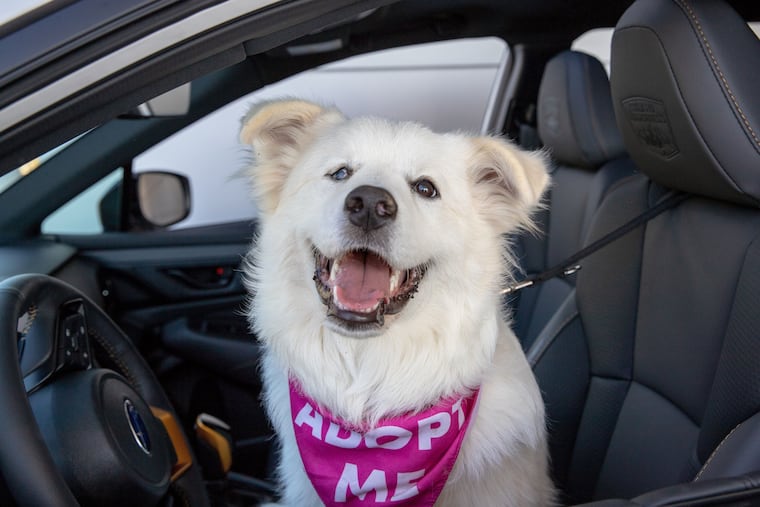An orthopedist, an equine surgeon, an engineer, a tech specialist, and three veterinary surgeons teamed up to save one puppy
The exact origins of Chelsea the dog’s back problems aren’t known. But a seven-member team performed an unusual surgery to fix them.

Chelsea, a fluffy, white snowball of a pup, has lived with pain most of her life. But you might not guess it from her spirit.
The 9-month-old Great Pyrenees rescue loves kids, cats, and other dogs. She’ll even do her best to play with the pigs that live at her Chester County foster home. That is, until the pain in her back and hindquarters gets too much.
In the past several months, her caretakers at To Love a Canine (TLC) Rescue and multiple veterinarians have looked for a way to end Chelsea’s pain and give her a shot of the life she deserves. Nothing had worked.
But a team of veterinary and human medicine experts are hoping they may have found the answer.
The unique surgery
On Dec. 7, a seven-member team of veterinary and human medicine surgeons performed an unusual, 5-hour-plus operation to stabilize Chelsea’s badly malformed lower spine and pelvis. The surgery also allowed the doctors to harvest a bone specimen to help determine the antibiotics needed to cure the persistent infection that had been plaguing the puppy. The operation included a bone graft infused with antibiotics, an experimental addition from the research of a PennVet large animal specialist on the team.
It will probably take about a month before Chelsea’s caretakers know if the surgery was the answer to the puppy’s problem. But shortly after the surgery, her doctors felt encouraged.
“I think it went very well. I think we all did what we had hoped to,” said Suzanne Rosen, a veterinary neurosurgeon with the Veterinary Referral Center, a specialty animal hospital in Malvern, and Chelsea’s lead neurosurgeon.
The operation was unusual in a number of ways, she said.
The complex surgery — involving both her spine and pelvic area — was more than twice as long as Rosen’s typical neurosurgery, and the level of collaboration was far from routine.
“I’ve never been a part of a surgery that brought together veterinary surgeons, an equine surgeon, an engineer, a human surgeon [orthopedist] — a lot of minds together,” Rosen said. “That was really unique.”
In addition, the physicians used a type of surgical pedicle screw system often used with humans but not commonly used for dogs. The screw stabilization doesn’t have the same infection risk as the surgical cement usually used for dogs, Rosen said — a concern with an animal already fighting an infection.
That infection had probably compromised some of the cushioning cartilage of Chelsea’s malformed joints, adding to her pain, according to John Ray, the human-medicine orthopedic spine surgeon who was a member of the surgical team. From Colorado, Ray, well-versed in the use of pedicle screws on people and able to lend that expertise to help Chelsea, was invited by his colleague Robert Bergman, a veterinary surgeon acting as a consultant for Neuromed, the source of screw system.
“In this particular case, this is not a sort of an overnight fix because really what we’re doing is stabilizing the spine so it can heal itself,” said Ray.
Shoved under a fence
The exact origins of Chelsea’s back problems aren’t known. Some of her doctors believe she was born with the malformation; Rosen thinks at some point, she experienced trauma, such as an injury from an accident or abuse that was never treated or properly healed.
All that’s known for sure is when she was about 3 months old, she was shoved under the fence of an animal shelter in Mississippi and abandoned in the dirt. The shelter, a high-kill facility, has a relationship with the TLC in Malvern, a foster-based rescue. Since July, Chelsea has been fostered by Marie Coladonato, a TLC assistant executive director.
“We noticed immediately that she didn’t have much muscle back there,” in her quarters, Coladonato said. “She was walking really weird.” She also lacked bladder control, even more than a usual puppy.
She was treated for possible tick-borne ailments and a urinary tract infection, but that wasn’t the solution. Despite her discomfort, the puppy, one of a breed valued as a protector of livestock and its loyalty to its people, was still game to play as much as she could.
“She’s very, very good at hiding her pain,” Coladonato said.
TLC brought Chelsea to specialists. Scans were done, and about $7,000 have been invested in her care. TLC recently started a blog through Chelsea’s eyes, Barking Back, so people could follow her journey. Then came Chelsea’s high stakes — and high hopes — surgery.
The next steps
If the surgery works as intended, it will alleviate her pain, and the right antibiotic will cure her infection. Rosen said she may always need to wear a canine diaper indoors. The dog doesn’t mind them.
“If it’s the right owner, it won’t matter,” Rosen said.
Chelsea went home with a protective head cone to give her sizable surgical incision wound down her back a chance to heal. But so far, so good, according to her caretakers.
In fact, the pup was temporarily on sedatives to slow her down a bit, along with anti-inflammatory medication.
“She’s almost like, Why am I so cooped up? I don’t understand you won’t let me hang out with my friends,” said Coladonato, her foster.
TLC is still fundraising to cover Chelsea’s medical costs — close to $20,000, with the surgery. Coladonato said it will all have been worth it when Chelsea finally gets the forever home she deserves.
“Our motto is, ‘Until they all have a home,’ and we always say we do whatever it takes to give these dogs a better tomorrow,” she said. “We made that promise to Chelsea before she came to Pennsylvania, so we’re going to see that through.”
To donate to help Chelsea, visit: https://www.tlcrescuepa.com/donate.